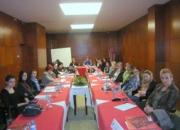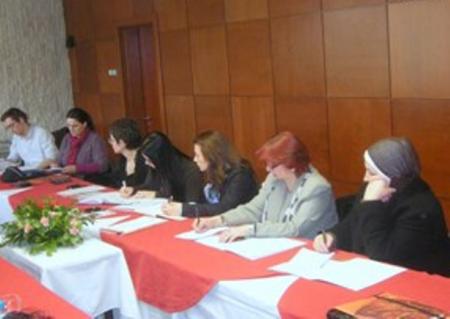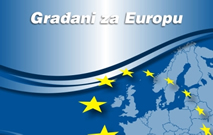Round table: Political involvement of BH women and religion as an integral part of today’s politics
 Association Vesta from Tuzla and the Friedrich Ebert Foundation from Sarajevo organized a round table in Tuzla on the topic “Political involvement of BH women and religion as an integral part of today’s politics.”Numerous male and female members of political parties and non-governmental organizations from Tuzla took part in the Round table. The keynote speakers were Ms. Smiljana Vovna, sociologist, and Professor Srđan Vukadinović.
Association Vesta from Tuzla and the Friedrich Ebert Foundation from Sarajevo organized a round table in Tuzla on the topic “Political involvement of BH women and religion as an integral part of today’s politics.”Numerous male and female members of political parties and non-governmental organizations from Tuzla took part in the Round table. The keynote speakers were Ms. Smiljana Vovna, sociologist, and Professor Srđan Vukadinović.
“Association Vesta continues along the line of its activities towards strengthening the role of women in the decision-making processes and, as always, we look forward to working with our female politicians and women who intend to become it. I think that today’s topic will open some new vistas and space for female action not only in Tuzla, but the wider region as well,” Ms. Amra Selesković, director of Association Vesta said.

Although women comprise the majority of the electorate in BIH, they are still considerably less involved actively in decision-making processes, at local as well as higher levels of decision-making. What is discouraging is the lack of public awareness about the crucial importance of equal representation of women and men in the political life of a democratic BIH. “If we take into account politics, religion and tradition, we will realize that in all these aspects the assumed role of women is the same. When we talk about the place and role of any woman, we take it for granted that a woman’s place is in the house, and her role is bear and rear children.
Traditionally, our society does not have confidence in women, which is evident from the fact that not even women vote for women. Nevertheless, I am optimistic and I believe in the youth, in highly educated young women who have the knowledge, will and strength to fight for the place which belongs to them,” as sociologist Smiljana Vovna pointed out.
In the opinion of Professor Srđan Vukadinović, traditionalism is a major obstacle to a modernization code according to which women would have a more important role in the public and political life of BIH. “In our country, nationalist parties and religion observe women very conservatively, and consider that their place is in the house, and not at work, in politics, or anywhere else. Unfortunately, religion has deeply infiltrated the political realm, although it is obvious that it does not belong. Religion still observes women in a very conservative way. We are all witnesses that not a single gathering or meeting of nationalist parties can take place without some prominent religious leaders, and when did any of those religious leaders ever promote a woman as president or prime minister?” asked Vukadinović and added, “Women must understand that they should fight for their equality with men in this society. They must overcome the stereotype that it is more important for women to stay at home than to engage in professional affairs. It is primarily important that women begin to perceive themselves differently before men perceive them as equal to themselves in all spheres, and women become aware of their equality.”
“BH politicians tie the knots on their expensive ties very professionally, while they are amateurs at resolving issues. Women should be the power that will set in motion all social developments in BIH, i.e. women should undertake the role of the corrector of the social consciousness, not men. However, that is very hard to achieve in BIH. In order for any woman to succeed in any form of social involvement, she would need a strategy, lobbying, family support, time, while all men need is money. There are two ways for women to achieve their goal, either to join a male lobby or to form their own,” maintains Ms. Amela Tupković from Bosanska stranka.
It is evident that the problem of the discrimination of women in BIH is more than just a frequent complaint from non-governmental organizations and socially aware young people, but a problem which will need to be seriously tackled if the country wishes to come closer to Europe. Maybe the resolution of the problem should start from school textbooks, where women are still represented exclusively as mothers and cooks, while men are the only ones granted the right to work.


